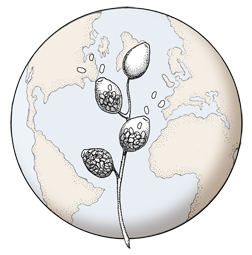Publication Type:
Journal ArticleSource:
Persoonia - Molecular Phylogeny and Evolution of Fungi, Volume 22, Issue 1, p.95 - 110 (2009)Keywords:
Beech, citricola, Decline, dieback, forest, multivora, nursery, oak, phylogenyAbstract:
During large-scale surveys for soilborne Phytophthora species in forests and semi-natural stands and nurseries in Europe during the last decade, homothallic Phytophthora isolates with paragynous antheridia, semipapillate persistent sporangia and a growth optimum around 25 °C which did not form catenulate hyphal swellings, were recovered from 39 host species in 16 families. Based on their morphological and physiological characters and the similarity of their ITS DNA sequences with P. citricola as designated on GenBank, these isolates were routinely identified as P. citricola. In this study DNA sequence data from the internal transcribed spacer regions (ITS1 and ITS2) and 5.8S gene of the rRNA operon, the mitochondrial cox1 and β-tubulin genes were used in combination with morphological and physiological characteristics to characterise these isolates and compare them to the ex-type and the authentic type isolates of P. citricola, and two other taxa of the P. citricola complex, P. citricola I and the recently described P. multivora. Due to their unique combination of morphological, physiological and molecular characters these semipapillate homothallic isolates are described here as a new species, P. plurivora sp. nov.


